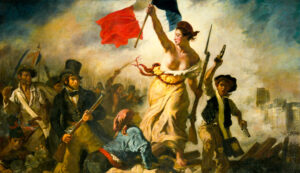The 150th anniversary of J.S Mill’s death seems a prime opportunity to reflect on the tangled mess that liberalism has bequeathed to the 21st century. Fairweather liberals can’t decide whether to torch their dusty copies of On Liberty or dust them off when the torches inevitably come for them.
Today, neoliberalism, broadly understood as the extension of markets and market logic into ever-expanding swathes of social and political life, is everywhere misunderstood as a straightforward legacy of the liberal Enlightenment. Worse, its supposed emphasis on individual autonomy and responsibility is widely seen as a vestige of dated illusions of human reason and freedom that are now too big for humanity’s boots. Wasn’t it the silly notion that reason could light the way to freedom that lit up the ovens in the death camps? Surely, if the 20th century has taught us anything, it’s that reason doesn’t need to be freed — it needs to be constrained. Far from needing to be raised up, humanity could use, so the popular prejudice goes, being knocked down a few notches.
But what critics fail to realise is that neoliberalism long ago left behind the rights-bearing human subject, one that was capable of self-reflection and worthy of autonomy and freedom. Humanity must be divested of these illusions. The real ideal is heteronomy, or a will that is relieved of responsibility and conditioned by external forces that stipulate the proper conduct of life. These ideal subjects are aware that their untrained, non-expert judgments are potentially dangerous; they thus look constantly to external rules to ensure they make the “correct” choice. And if no such rules exist, they demand them. Think, for instance, of the profound unease many felt when governments did not stipulate whether and how they might hug family members as the pandemic wound down.
If you spend too much time in academic circles, you might get the idea that neoliberalism’s supposed valorisation of freedom and autonomy is an evil that lurks behind every corner. For instance, critics of therapeutic fads like the self-esteem movement of the Nineties and recent obsessions with promoting “mindfulness”, “wellbeing” or mental health often argue that these crusades are really part of an overarching neoliberal project bent on creating ideal, self-governing subjects —autonomous, self-reliant individuals who won’t call on expensive state or employer supports. However, what is frequently left out of such analyses is the question of why it is so taken for granted that such subjects need to be created in the first place. The human capacities that had so animated the liberal Enlightenment — rationality, a capacity for self-reflection and conscious judgment — are now seen as uncharacteristic not just of women and minorities who had once been left out of it, but of the vast majority of humanity.
Indeed, flipping through the pages of newspapers and magazines, one is persistently reminded that it is humanity’s persistent lack of capacity for self-determination that supposedly underlies a host of social ills. Mindfulness gurus tell us that we spend our time on “autopilot”, going through the motions of life unthinkingly and leaving disaster in our wake. Governments have been receptive to such claims, seeing interventions that help citizens to “pay attention to what’s happening in the present moment” as the solution to myriad social issues. What is more, the fact that we are unaware of this — that we carry on thinking that we are in control of our lives, much less our inner lives, is part of the problem.
But don’t worry, the “experts” have the solution. Fund their ever-proliferating programmes. Buy their new book. Adopt their creepy brain surveillance technologies. And before long, when we give up our silly illusions of freedom, wellbeing and happiness will prevail.
At the heart of this confusion lies the fact that neoliberalism long ago dispensed with Mill’s notion of freedom as about removing barriers to human flourishing. Today’s crusades, from attacking “white privilege” to accommodating the needs of proliferating minority groups, are much more focused on protecting child-like citizens from each other. Longstanding movements for indigenous self-determination, for instance, have gradually shifted towards therapeutic obsessions with the indigenous person as a “traumatised” subject in need of extensive intervention. Even institutional defenders of free speech can’t help but reach for justifications based on protecting the weak and vulnerable.
Having jettisoned the Enlightenment subject on which so many liberal freedoms rest, it is little surprising that contemporary society finds it difficult to place freedom at the centre of social and political life. Even David Harvey’s widely referenced Marxist critique of neoliberalism struggles to wrest a powerful subject from its entanglements with neoliberal logic. He criticises neoliberal assumptions that, for example, all “agents acting in the market… have access to the same information”, as at best “utopian”. In other words, a key criticism of neoliberalism as an economic doctrine rests on its emphasis on a classical liberal subject that does not really exist. Unmasking this fiction becomes a key part of explaining why neoliberalism so often leads to ruin. It seems we can’t challenge the power of neoliberal economics without destroying the classical liberal subject along the way.
But if the Enlightenment subject, capable of reflecting on emotions and experience and rationally deciding how to live, is a myth, then freedom is not only not a goal — it’s a problem. Vulnerable subjects don’t need to be freed. They need to be protected.
In the place of this “myth”, we have valorised what Kant, at the dawn of the Enlightenment, warned against: an ideal human subject that is content (or perhaps in today’s parlance, sufficiently “mentally well”) to revel in self-imposed immaturity. The good citizen now has learned to embrace a rule that springs from a foreign will as a matter of course. This is why “neoliberalism” is a bit of a misnomer. Instead of revitalising some kind of classical liberal project, it sounded its death knell. And in its place, our democratic will was subordinated to that of the expert and the technocrat.
Today, as a result, whenever public discussion erupts, someone always seems to interject that now everyone suddenly thinks they’re an expert. But this is precisely where even liberals fall short. The truly liberal response to such comments would be “every cook can govern”, not “that persons of talent, the more known and respected the better, should put themselves forward”. Yet the former was not said by Mill or any 19th-century liberal – but by the Trinidadian Marxist C.L.R James in 1956.
The latter, on the other hand, was written by Mill, in reference to the American Civil War in 1861. It’s interesting here to compare Mill’s remarks with those of his contemporary, Karl Marx, who was also writing about the same events as they unfolded. While both men agreed that slavery and the power of slave owners must end, as August Nimtz describes, they differed profoundly on which force would prove decisive in bringing this about. And Nimtz continues, history seems at least to show that it was the middle and working classes, and not men from Mill’s milieu, that often proved most decisive in the conflict.
And yet, descend from the halls of academia and into the hellscape of our social media squares, and you will find that it is Marx who is vilified as the incarnation of illiberalism. The ominous label of “cultural Marxism”, or now just “Marxism”, is wielded to decry the erosion of individual rights. Yet it was Marx, writing in 1842, who emphasised that “the truly radical cure for censorship would be its abolition”. And it was Marx who defended freedom of the press, describing it as a thing of “beauty” “without which my nature can have no full, satisfied, complete existence”. What is more, Marx himself did not waver in his commitment to democracy. “Democracy,” he wrote, “is the solution to the riddle of every constitution”, because it is where “we find the constitution founded on its true ground; real human beings and the real people… posited as the people’s own creation”.
In fact, although his writings were later twisted by his successors to justify repression in his name, Marx’s commitment to liberty, democracy and free speech surpasses many liberal theorists. By the time Mill wrote anything on the American Civil War, for instance, Marx had written (or had ghostwritten via Engels) at least 18 articles on the topic. Moreover, following the emancipation of the slaves, while Marx and Engels looked immediately to agitating for the expansion of freedom in the form of suffrage to former slaves, it was Mill who considered the potential need to hold back the freedoms of the “privileged” in order to make enfranchisement a possibility. He even mused that without black suffrage, a “military dictatorship” lasting “two generations” would be necessary before “the stain which the position of slavemaster burns into the very souls of the privileged population can be expected to fade out”. While Marx was analysing the colonies as illustrating capitalism’s tendency to eat up whatever “primitive” forms of freedom existed there, Mill defended “despotism” as legitimate when dealing with “barbarians” provided those in power had the best of intentions.
Where Marx differed was in his belief in the self-governing capacities of all human beings, not just the learned or the better or the higher or whatever is the going excuse of the time. Against the grain of conventional wisdom, Marx’s advocacy for individual freedom often surpasses the efforts of Mill and other liberal luminaries. Marx vested his faith in human reason and held that history could be shaped by the collective force of rational thought.
Where does this leave us today? Well, we clearly do need those copies of On Liberty, but to have a true commitment to liberty we could do with also recalling the liberal core of Marx’s writings. For while Marx and Mill agreed on more than history gives them credit for, it was Marx who surpassed Mill in the expansiveness of his vision of human freedom and in his refusal to accept external limits to its expression. Today, everywhere we see excuses, and sadly often in Marx’s name, for why freedom should be rolled back to “protect the vulnerable”. But in the 19th century, it was Marx, more than Mill, who looked down those pathways to freedom that thinkers of the liberal Enlightenment built, but that they often could not bring themselves to travel.
Disclaimer
Some of the posts we share are controversial and we do not necessarily agree with them in the whole extend. Sometimes we agree with the content or part of it but we do not agree with the narration or language. Nevertheless we find them somehow interesting, valuable and/or informative or we share them, because we strongly believe in freedom of speech, free press and journalism. We strongly encourage you to have a critical approach to all the content, do your own research and analysis to build your own opinion.
We would be glad to have your feedback.
Source: UnHerd Read the original article here: https://unherd.com/




